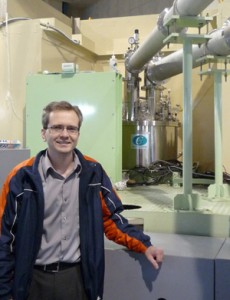
Dr. Jeff Martin, UWinnipeg Physics professor is spearheading research with PIPE
Winnipeg MB – Prairie Isotope Production Enterprise Inc. (PIPE) – a partnership between Winnipeg Regional Health Authority (WRHA), Health Sciences Centre Winnipeg (HSC), University of Winnipeg and Acsion Industries (Pinawa) – has received $7.46 million from the Natural Resources Canada (NRCan) Isotope Technology Acceleration Program (ITAP) towards an $11.7 million project to commercially develop a new, safer, more affordable and reliable way to produce medical isotopes for the Canadian market.
“I am delighted that the Harper Government is investing in three projects, one of which is in my community, led by innovative Canadian organizations that have already made great strides in transforming the way medical isotopes are produced in Canada,” said Joyce Bateman, Member of Parliament for Winnipeg South Centre. “The project with PIPE will work to commercialize cutting-edge technologies, enabling the production of isotopes Canadians rely on for medical diagnosis, while creating jobs and export potential.”
Currently, medical isotopes are produced in nuclear reactors using enriched uranium as the raw material. PIPE will instead develop isotopes using linear accelerators.
The University of Winnipeg will continue to contribute considerable expertise to PIPE’s team under the leadership of Physics professor, Dr. Jeffery Martin, Canada Research Chair in Fundamental Symmetries in Subatomic Physics – Dr. Lloyd Axworthy, President and Vice-Chancellor, UWinnipeg.
“The isotope supply from the two principal nuclear reactors in Canada and The Netherlands is unreliable and adds an unacceptable supply risk to Canadian patients,” said Dr. Kennedy Mang’era, Head of WRHA’s Radiopharmaceuticals Research Group and Director of HSC’s Radiopharmacy. “Linear accelerator technology is an innovative, inexpensive and environmentally friendly approach to isotope production.”
Under Dr. Mang’era’s leadership, PIPE has demonstrated that high-quality technetium-99 (Tc-99m) – the most widely used isotope for medical imaging, accounting for approximately 80 percent of the 5,500 daily nuclear medicine diagnostic procedures in Canada – can be extracted from linear accelerator-produced molybdemum-99 (Mo-99) without using radioactive materials or generating radioactive waste.
PIPE will continue to work with world-leading research institute Canadian Light Source (CLS) in Saskatoon on this project. CLS will produce the Mo-99, from which Dr. Mang’era’s team will extract the Tc-99m, test its purification and conduct clinical trials within the WRHA to demonstrate its use and efficacy in nuclear medicine diagnostic tests for cancers and heart disease.
“Our objective is to license the purified isotope for patient use and to become a regional supplier of the isotope for healthcare facilities across western Canada and northern Ontario by 2016,” said Dr. David Walker, Chair, PIPE. “We have the experts and partners at the table to further develop the technology right here on the prairies.”
“During the isotope shortages of 2007, 2009 and 2010, we had an effective mitigation strategy in place for Manitoba patients that minimized the impact on care,” Dr. Brock Wright, WRHA Chief Medical Officer and Senior Vice President, said. “We are proud to be leaders in establishing a long-term solution to this issue that involves developing innovative technologies right here in Manitoba.”
“Acsion is very proud to be part of this important Canadian initiative,” said Chris Saunders, President of Acsion. “Our ITAP work will lead to a more reliable supply of life-saving radio-pharmaceuticals for Canadian patients – the very reason for which PIPE was established.”
The balance of this $11.7 million project, $3.54 million, is comprised of equity contributions from PIPE members. The ITAP funding is a repayable contribution over 10 years beginning in 2016, should there be profits from successful isotope commercialization.
PIPE estimates that the addition of two linear accelerators to the current stable will enable it to produce and supply isotopes for the entire Canadian market.
About Prairie Isotope Production Enterprise Inc. (PIPE)
PIPE is a not-for-profit corporation based in Manitoba. PIPE’s goal is to develop a reliable supply of the medical radioisotope technetium-99m (Tc-99m) for Canadian patients. Benefits to Canadians include having a domestic supplier focused on serving Canadian patients; multiple production facilities across the country to ensure a continuous supply of products; and no radioactive waste streams, as all materials will be recycled.
BACKGROUNDER
How does PIPE produce isotopes using a linear accelerator?
A linear, or particle, accelerator at CLS in Saskatoon bombards a target of molybdenum metal with high-energy x-rays. The x-rays knock a neutron out of some of the molybdenum atoms, which convert them to molybdenum-99 (Mo-99). The Mo-99 is recovered and transported to HSC Winnipeg.
Mo-99 spontaneously converts by radioactive decay to the metastable form of technetium-99 (Tc-99m). This Tc-99m is chemically separated from the Mo-99 solution and purified in the HSC lab. It is then ready to be used to produce selected radiopharmaceuticals that can be injected into patients for a variety of tests, including PET/CT, bone and organ scans.
How is PIPE’s technique different than current isotope production?
Mo-99 is currently produced by a small number of research reactors around the world including the National Research Universal (NRU) reactor at Chalk River Laboratories in Ontario. In a nuclear reactor, Mo-99 is produced by fissioning uranium (U-235), followed by processing and purification. It also generates radioactive waste.
PIPE’s production has no radioactive waste that needs to be managed like the current production methods that use uranium. Acsion is leading the recycling program of the project and will regenerate waste into targets for re-use in the linear accelerator. This has both environmental and economic benefits.
How has development of alternative isotope production been funded?
In January 2011, the Government of Canada announced an investment of $35 million into four technology projects to develop new ways of producing the key medical isotope technetium-99m (Tc-99m). Tc-99m is the most widely used isotope for medical imaging and accounts for approximately 80 percent of nuclear medicine diagnostic procedures (e.g. bone scans, heart imaging, PET/CT scans). PIPE completed one of these projects.
In June 2012, the Government of Canada launched the $25 million Isotope Technology Acceleration Program (ITAP) to further advance the development of alternatives to existing isotope production technologies and to support the Government’s strategy to move towards a fully market-based supply chain in 2016. PIPE received $7.46 million of this funding to help cover PIPE’s ITAP cost of $11.7 million.





